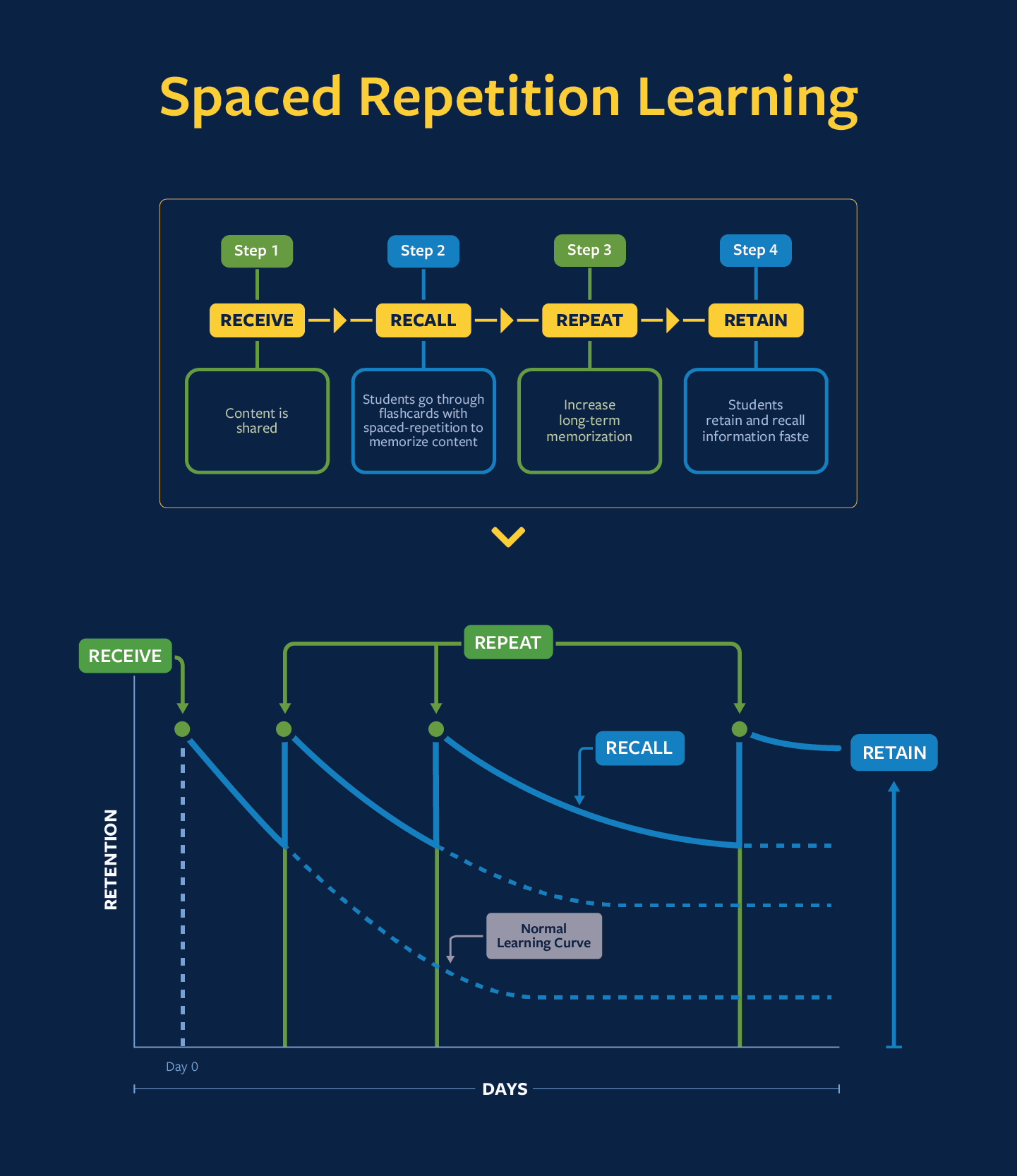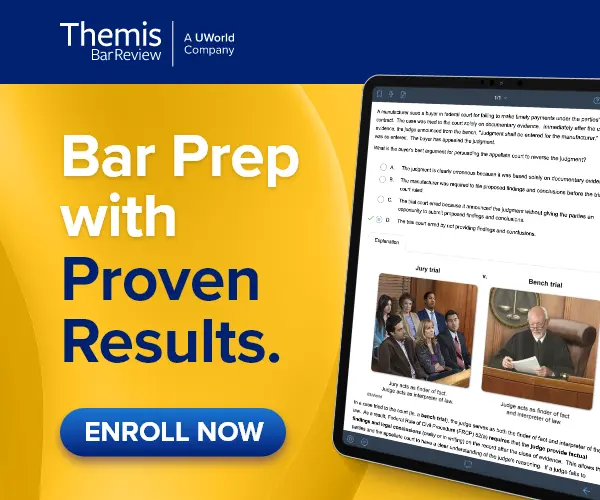7 Highly Effective Memorization Techniques for the Bar Exam
In the aftermath of the tragic collapse of a banquet hall in ancient Greece, Simonides of Ceos experienced an epiphany that would forever change the art of memory. Amidst the chaos, he found he could recall where each guest had been sitting simply by picturing the hall's layout in his mind.
This insight led to the birth of the "Memory Palace," a method where information is tied to specific spatial locations, allowing for astonishing recall abilities. This ancient technique, now supported by empirical evidence, is just 1 of the 7 highly effective bar exam memorization techniques we'll cover below.
1. Understand the Theory Behind the Law
Understanding the theory behind the law is like learning to navigate your city without relying on GPS. Remembering the route from home to school is easy, much like memorizing specific, frequently cited legal facts or rulings. However, understanding the city's layout, the way its streets connect, and the landmarks that define it transform your ability to navigate. You start to see the city as an interconnected network, not just isolated paths.
Similarly, developing a firm grasp of the theory behind fundamental legal principles deepens your understanding of legal consistency and predictability across the legal system. This systematic approach to studying law turns abstract concepts into a connected web of knowledge, helping you retain information more efficiently.
2. Spaced Repetition
Spaced repetition involves reviewing information at increasing intervals depending on your confidence in the material—the more difficult, the more frequently you review. This process is based on the "spacing effect," which suggests that we retain information more efficiently when encountering it repeatedly over spaced intervals rather than cramming in short sessions.
For example, you remember how to get from home to school because you make the trip frequently. The less often you visit a location, the harder it is to remember how to get there. In the same way, reviewing a law every day, then every other day, then every week, will leverage your mind's tendency to prioritize information that frequently appears over a prolonged period.
Themis + UWorld’s spaced-repetition flashcards allow you to transfer visual and textual source content, add custom annotations, and study by topic, subtopic, or custom tag.

3. Take Practice Tests
The best way to learn to drive is by driving. You can watch others, memorize all the rules of the road, read your car manual, and study roadmaps, but things change once you get behind the wheel. However, the cognitive load it takes to drive is reduced the more you practice until it becomes intuitive.
Practice tests aren't just about assessing knowledge; they help you retain information. Research by Karpicke and Roediger (2008) published in "Science" showed that repeated testing over spaced intervals dramatically improved retention compared to repeated study. The testing effect was attributed to the process of actively recalling information, which strengthens neural connections related to the material, thereby making future recalls more accessible.
UWorld's MBE QBank is now fully integrated into Themis. You can customize unlimited practice tests by topic, subtopic, or custom tag from an extensive bank of exam-level questions.
4. Progress and Performance Tracking
We've been using a lot of driving analogies, so why not continue? Imagine driving somewhere new without GPS. It might take some time before you realize you're lost. You might make it to your destination, albeit late and after having gone down many unnecessary roads. Your GPS provides real-time feedback to efficiently get to where you're going.
Routine progress self-assessments work the same way: pinpointing your knowledge gaps so you can know what you don't know and take a direct route to turn those weaknesses into strengths. This process is grounded in metacognition—the awareness and regulation of your learning process (thinking about your thinking). It allows you to reflect on which concepts are challenging and why, then adjust your study plan accordingly.
Themis's advanced analytics detail your proficiency in each MBE subject and subtopic, allowing you to target your weaknesses with practice tests and turn them into strengths.

5. Mnemonics
Just as "turn at the red barn" helps you recall a route more easily, mnemonics act as signposts for your memory, making recalling intricate information as intuitive as driving past a familiar landmark.
To use mnemonics, identify key legal concepts that require memorization and create vivid, associative cues for each. For instance, to remember Adverse Possession, you can use "CHANGE”:
● Continuous
● Hostile
● Actual
● Notorious
● Goes on for the statutory period
● Exclusive
6. Memory Palace
The Memory Palace technique is underpinned by the “method of loci” research. Research published in Smithosianian magazine involved 23 participants who, after 30 minutes a day of memory training using the method of loci, more than doubled their memory recall ability in just 40 days. These improvements persisted four months after the initial training, without further practice. Here's how to build your memory palace:
1. Select your "palace"—your home, a regular walking route, a favorite park, etc.
2. Break down content into manageable chunks based on the topics or subtopics you want to include.
3. Select a path through your palace, passing each area in step 2.
4. Sequence ideas in a coherent order or hierarchy. Real Property may be a room and its subtopics objects in the room.
5. Recall by retracing the path you've created until you come to the information you've retrieved.
7. Take Breaks
Scientific research underscores the significance of rest periods for enhancing learning outcomes. The brain uses downtime to process and retain new information, a phenomenon known as the consolidation process.
Furthermore, studies show that prolonged study sessions without adequate breaks can decrease productivity and increase stress. A balanced schedule with regular, short breaks—such as the Pomodoro Technique, which suggests a 5-minute break every 25 minutes of study—can rejuvenate the mind and improve focus, allowing for increased retention.
Lean on What Works for You
There is no best technique of these 7. They should all be used together. For example, you may nest mnemonics in your flashcards or use the memory palace to help you understand the theory behind a law. What's most important is that you leverage the strengths of each method while emphasizing the strategies that have worked for you in the past.
Recent Posts
How to Recover After a Difficult Law School Semester
Best Study Strategies for Neurodivergent Law Students
7 Highly Effective Memorization Techniques for the Bar Exam
7 Legal Writing Tips for Law Students
The Art of Outlining for 1L Final Exams
Balancing Academics and Extracurriculars: Time Management Tips for 2L Students
7 Strategies to Prepare for the Socratic Method During 1L Year
How to Make a Bar Exam Study Schedule | 5 Tips with Examples
A Law School Student’s Guide to Stress and Burnout
Ace Your 1L Exams: 9 Actionable Tips from an Attorney
Tackling the MPRE with Confidence
A 1L Student's Guide to Legal Language
Navigating Your First Year of Law School: Tips for Success
Trust, Transparency, Results: The How and Why of Themis Pass Rates
Holiday Party Etiquette Advice for Almost Lawyers
Halloween Costumes That Only a Lawyer Could Love
Secrets To Breaking Through The 'Breaking Points' of Law School and Beyond
Brutally Honest 1L Advice From A Brilliant, Bitterly Brunette Attorney
2L/3L Life: 10 Preach-Free Pieces of Advice for Almost Lawyers



